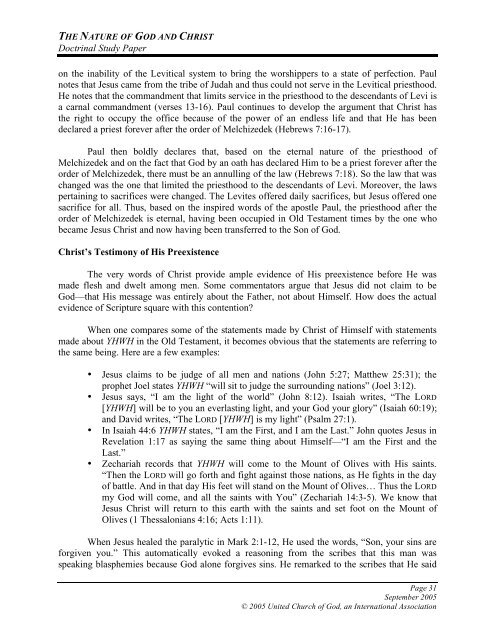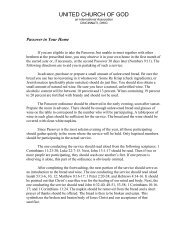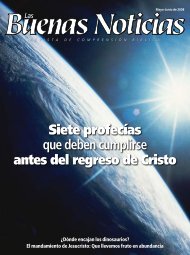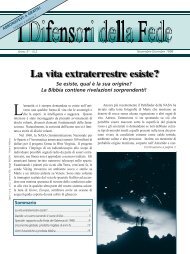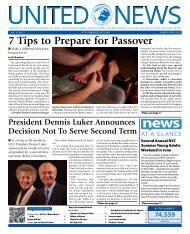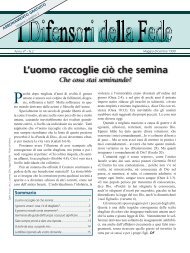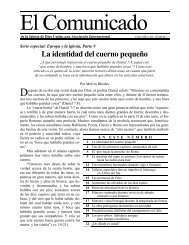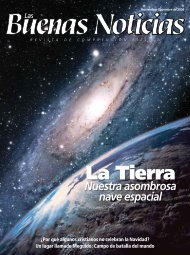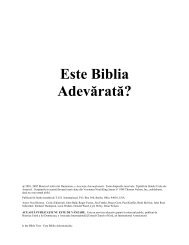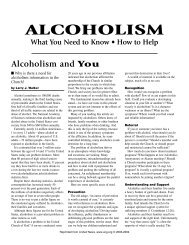The Nature of God and Christ - Members Site - United Church of God
The Nature of God and Christ - Members Site - United Church of God
The Nature of God and Christ - Members Site - United Church of God
- No tags were found...
You also want an ePaper? Increase the reach of your titles
YUMPU automatically turns print PDFs into web optimized ePapers that Google loves.
THE NATURE OF GOD AND CHRISTDoctrinal Study Paperon the inability <strong>of</strong> the Levitical system to bring the worshippers to a state <strong>of</strong> perfection. Paulnotes that Jesus came from the tribe <strong>of</strong> Judah <strong>and</strong> thus could not serve in the Levitical priesthood.He notes that the comm<strong>and</strong>ment that limits service in the priesthood to the descendants <strong>of</strong> Levi isa carnal comm<strong>and</strong>ment (verses 13-16). Paul continues to develop the argument that <strong>Christ</strong> hasthe right to occupy the <strong>of</strong>fice because <strong>of</strong> the power <strong>of</strong> an endless life <strong>and</strong> that He has beendeclared a priest forever after the order <strong>of</strong> Melchizedek (Hebrews 7:16-17).Paul then boldly declares that, based on the eternal nature <strong>of</strong> the priesthood <strong>of</strong>Melchizedek <strong>and</strong> on the fact that <strong>God</strong> by an oath has declared Him to be a priest forever after theorder <strong>of</strong> Melchizedek, there must be an annulling <strong>of</strong> the law (Hebrews 7:18). So the law that waschanged was the one that limited the priesthood to the descendants <strong>of</strong> Levi. Moreover, the lawspertaining to sacrifices were changed. <strong>The</strong> Levites <strong>of</strong>fered daily sacrifices, but Jesus <strong>of</strong>fered onesacrifice for all. Thus, based on the inspired words <strong>of</strong> the apostle Paul, the priesthood after theorder <strong>of</strong> Melchizedek is eternal, having been occupied in Old Testament times by the one whobecame Jesus <strong>Christ</strong> <strong>and</strong> now having been transferred to the Son <strong>of</strong> <strong>God</strong>.<strong>Christ</strong>’s Testimony <strong>of</strong> His Preexistence<strong>The</strong> very words <strong>of</strong> <strong>Christ</strong> provide ample evidence <strong>of</strong> His preexistence before He wasmade flesh <strong>and</strong> dwelt among men. Some commentators argue that Jesus did not claim to be<strong>God</strong>—that His message was entirely about the Father, not about Himself. How does the actualevidence <strong>of</strong> Scripture square with this contention?When one compares some <strong>of</strong> the statements made by <strong>Christ</strong> <strong>of</strong> Himself with statementsmade about YHWH in the Old Testament, it becomes obvious that the statements are referring tothe same being. Here are a few examples:• Jesus claims to be judge <strong>of</strong> all men <strong>and</strong> nations (John 5:27; Matthew 25:31); theprophet Joel states YHWH “will sit to judge the surrounding nations” (Joel 3:12).• Jesus says, “I am the light <strong>of</strong> the world” (John 8:12). Isaiah writes, “<strong>The</strong> LORD[YHWH] will be to you an everlasting light, <strong>and</strong> your <strong>God</strong> your glory” (Isaiah 60:19);<strong>and</strong> David writes, “<strong>The</strong> LORD [YHWH] is my light” (Psalm 27:1).• In Isaiah 44:6 YHWH states, “I am the First, <strong>and</strong> I am the Last.” John quotes Jesus inRevelation 1:17 as saying the same thing about Himself—“I am the First <strong>and</strong> theLast.”• Zechariah records that YHWH will come to the Mount <strong>of</strong> Olives with His saints.“<strong>The</strong>n the LORD will go forth <strong>and</strong> fight against those nations, as He fights in the day<strong>of</strong> battle. And in that day His feet will st<strong>and</strong> on the Mount <strong>of</strong> Olives… Thus the LORDmy <strong>God</strong> will come, <strong>and</strong> all the saints with You” (Zechariah 14:3-5). We know thatJesus <strong>Christ</strong> will return to this earth with the saints <strong>and</strong> set foot on the Mount <strong>of</strong>Olives (1 <strong>The</strong>ssalonians 4:16; Acts 1:11).When Jesus healed the paralytic in Mark 2:1-12, He used the words, “Son, your sins areforgiven you.” This automatically evoked a reasoning from the scribes that this man wasspeaking blasphemies because <strong>God</strong> alone forgives sins. He remarked to the scribes that He saidPage 31September 2005© 2005 <strong>United</strong> <strong>Church</strong> <strong>of</strong> <strong>God</strong>, an International Association


